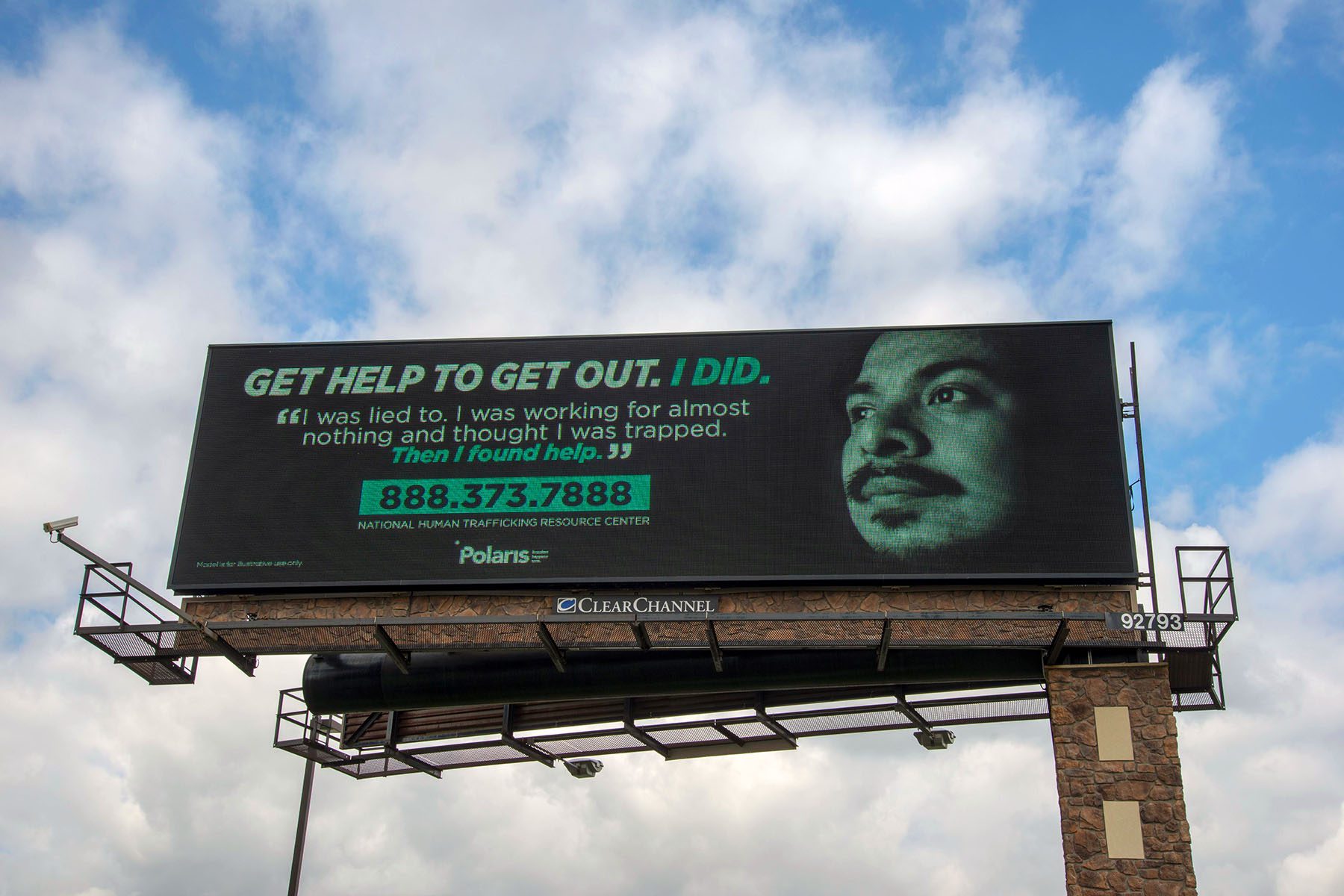Each year, tens of thousands of people text or call 1-888-373-7888, the national human trafficking hotline. Now, lawmakers are pushing to require that number to be posted in every airport, bus station, rail station and all ports of entry in the United States.
Senators introduced on Thursday the Human Trafficking Prevention Act, bipartisan legislation which was shared first with The 19th. The bill would direct the Departments of Transportation and Homeland Security to ensure the hotline is also visible in every individual plane, bus and train restroom. The companion bill, introduced by Reps. Hakeem Jeffries, a Democrat, and Darrell Issa, a Republican, passed in the House in July.
Democratic Sen. Maggie Hassan of New Hampshire, one of the bill’s primary sponsors, said transportation hubs are a “common-sense place to intercede” by letting victims and bystanders know who to call for help.
“Our bill is an important effort to address one of the greatest evils in our society,” Hassan said in a statement. “And I will continue working with my colleagues across the aisle to stamp out human trafficking, hold perpetrators accountable and save victims.”
Despite the large number of phone calls, texts, emails and online tips to the hotline — which is operated by the Polaris Project, an advocacy group, and available at humantraffickinghotline.org — only a fraction of incidents end in a prosecution. In 2020 alone, the hotline received more than 51,000 “substantive” tip reports, according to the group’s latest national hotline data. Yet, that same year, only 2,198 people were referred to U.S. attorneys for human trafficking offenses and about half of those were charged, according to data from the Department of Justice.
“Human trafficking is a heinous crime that threatens the well-being of women, men and children across this country and around the world,” Sen. Jacky Rosen of Nevada, a Democrat and another sponsor of the bill, said in a statement. “The national human trafficking hotline has been a highly effective tool in helping victims, and I’m helping introduce this bipartisan legislation to ensure that it is even more visible in Nevada and nationwide.”
Of the tens of thousands of alleged victims identified by tips to Polaris, nearly 60 percent were women and about half were not U.S. citizens. The hotline is primarily funded by the Department of Health and Human Services.
Experts and advocates applauded the legislation but insist that more action be taken to address the root causes of the problem.
Polaris called the legislation “an important step in intervention” but said more needs to be done to actually prevent trafficking from happening.
“We now know that trafficking is the predictable result of social, political and economic inequities and injustices,” a Polaris spokesperson told The 19th. “To really prevent trafficking, we must work together to tackle the underlying patterns of exploitation that allow trafficking to happen in the first place.”
Mary Twis, an assistant professor of social work at Texas Christian University who studies and has worked with sex trafficking survivors, said the increased signage will certainly raise awareness among the public and will hopefully lead to more arrests. However, she said, the government needs to work towards “reducing systemic inequalities” that lead to the targeting of “entire subpopulations of people.”
Jonathan White, an associate professor of sociology at Bentley University who teaches about human trafficking, said that the majority of human trafficking victims are undocumented immigrants, generally vulnerable women who are at the mercy of whoever is employing, housing or holding them. The current laws and public sentiment give traffickers more power over victims, who fear imprisonment or deportation, he added.
Anne Douds, the chair of public policy at Gettysburg College, said it was exciting to see Congress consider an “evidence-based approach” that also promotes community-based research. The bill also develops resources for local-level data collection, which Douds said will help law enforcement better understand who is trafficked and how they’re trafficked so they can disrupt those chains. Douds also pointed out that more could be done to center victims in the solution and offered one suggestion: funding for human trafficking courts.
“Human trafficking courts are one of the ‘specialized courts’ or ‘treatment courts’ that you may have heard of, like drug courts or veteran courts,” Douds said. “They can be quite effective at coordinating services and simultaneously resolving criminal charges.”
Sheila Hayre, a clinical professor of law at Quinnipiac University, agreed that there needs to be a review of the criminal legal system as well. Hayre, whose clinic has represented trafficking victims, said that she has noticed that too often prosecution of traffickers takes precedent over the protection of victims.
“We need to prosecute traffickers, but even in cases where bringing a prosecution is not feasible or possible, the federal government should be committed to providing protection to victims in the form of services and support,” Hayre said.
Increased signage helps, Hayre said, but there should be federal provisions and other resources that protect victims from being prosecuted for crimes that were the result of force, fraud or coercion by a trafficker.
Republican Sen. James Risch of Idaho, the bill’s third sponsor, said Congress must do “everything in its power” to combat human trafficking.
“There is still more to be done, and I will continue to support anti-trafficking efforts, provide victims with the necessary resources, and ensure traffickers are punished to the fullest extent,” Risch said in a statement.







